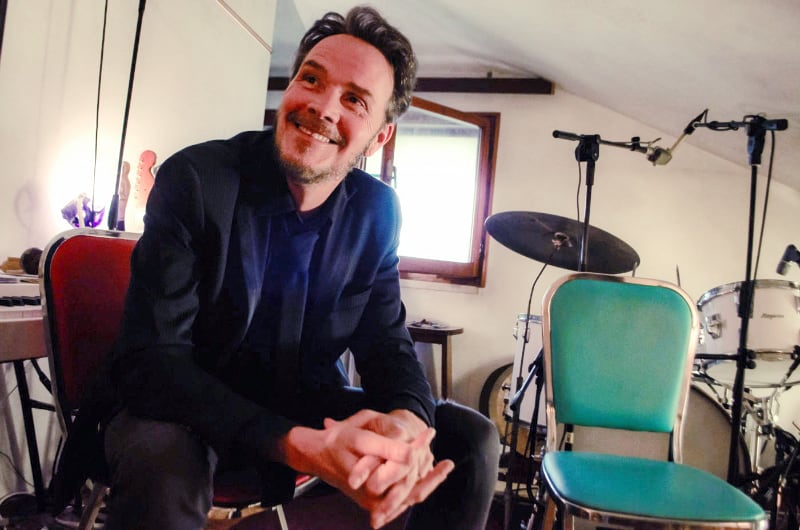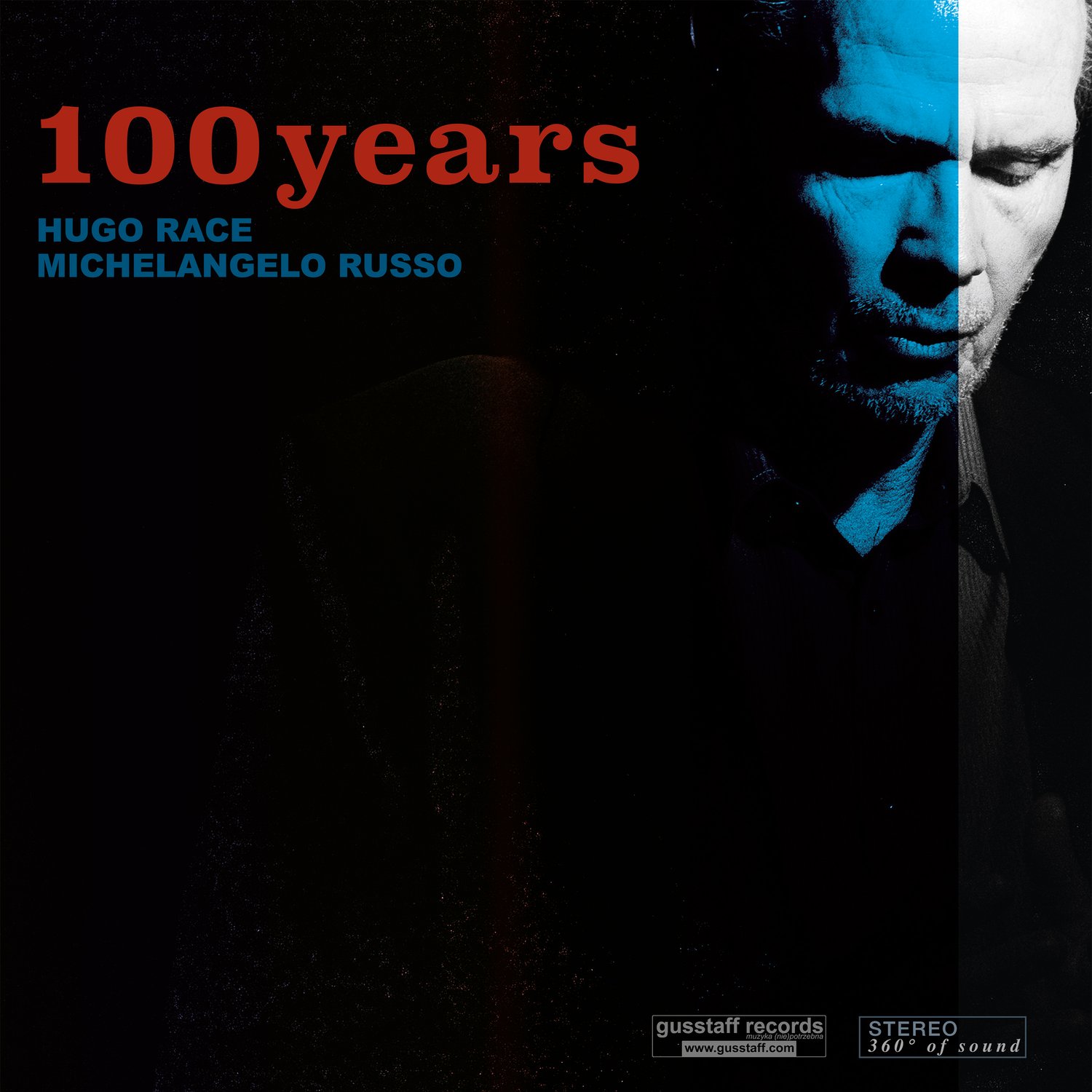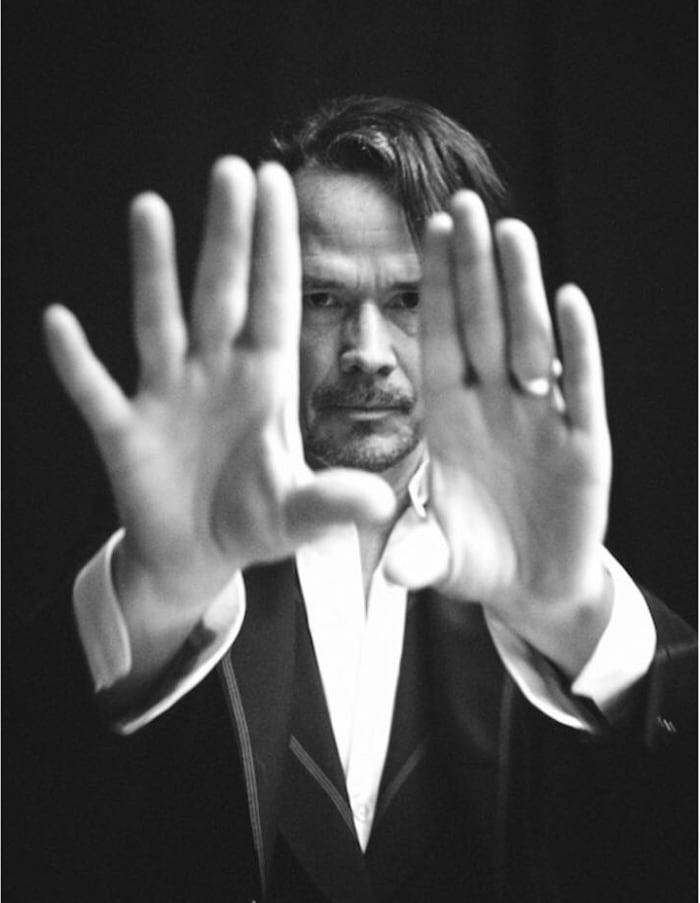 Sara Alice Ceccarelli photo.
Sara Alice Ceccarelli photo.
He's as well known in Australia for fronting '80s Melbourne blues rockers The Wreckery as he is in Eruope for his work with The True Spirit, Fatalists and Dirtmusic, and onetime Bad Seeds guitarist Hugo Race is a man who never stands still. His latest album is a moody collaboration with Michaelangelo Russo called "100 Years" that's as sweeping in its musical vision as it is deeply rooted in the blues.
After immersing himself in "100 Years, Robert Brokenmouth was prompted to seek an audience with Hugo and ask him some probing questions. Their wide-ranging chat is here.
Robert Brokenmouth: Your new album”100 Years” reminds me a little of Ry Cooder's “Paris, Texas”, this vast landscape that we traverse, picking up bits of our lives like grass seeds... it's as much an involving film as a flowing river.
Hugo Race: “Paris, Texas” is a powerful mood piece, the music raw and free to follow its natural path as an instrumental film soundtrack, actually a pretty great film. I’ve said this before but each album I make feels like a movie with its own time era and permeating mood and flavor. “100 Years” began as instrumental music, then words started coming through... but I wanted to leave a lot of space without words and let the music just flow, avoiding predictable structures. There’s a kind of impressionistic narrative that doesn’t have to be too clear, ultimately it’s about the listeners' perception.
https://youtu.be/2UUdxuBRDvg?si=Vhghi5i_8CaEIcuE
RB: Of “100 Years”, you've written that "a stream of consciousness about people close to me missing from the now, from the past, from dreams, set in a mythic twilight where all of us are essentially alone, missing those we love in the same way they're missing us. And it felt strange but right".
Hugo Race: The Pandemic shook everything up, created waves of unwelcome change for anybody living and working outside the matrix without bosses or health insurance or other formal restraints. The pandemic was not a good time to be an independent freelance worker in the arts. In some ways it was the grisly end of a dream that began in the 1960s summer of love – I remember 2020 as the year the digital cage clicked shut. The great disconnect that's messing with our heads. Sometimes people are missing but actually you know where they are, its just they're not home anymore...
RB: Among other things, I wonder if we are addicted to our emotions, to the point where reason is merely a construct...? At what points do reality and our emotive textures collide? Are either even real...?
Hugo Race: Well, it seems to me our reality is created by our emotions and they're not separate, they influence and maybe can't exist without each other. Reality is a construct, unique to each observer and worse, its not even real, pure subjectivity. Also, the media including politics and all that shit in the internet, is constantly trying to manipulate us emotionally. Its outrageous and so obvious. I like the non-attachment approach, keeping some distance, knowing I'm probably wrong and that a happy ending can have deadly consequences.
RB “100 Years” has a hypnotic, semi-drone, almost somnambulant throb to it... and such a big, vaulting sound ... I found myself re-listening to your John Lee Hooker LP ... is this - or should this be - the natural locus for modern blues? Could you tell us what you think the blues is... for you, at least?
Hugo Race: That big vaulting sound is why we’re in this to start with, it’s what I want to hear... an expanded dimension of sound speaks to me of dreams, alternating realities, a space where you can breathe. Musically, we are really minimal. I don't want lots of notes getting in the way. John Lee Hooker said, it’s just a couple of chords, nothing to it, its just a beat. And then sometimes we take the beat away and watch it all implode and expand. Our songs don’t change chord, they don’t have to, it’s not where the action is – the real action is sonic, not harmonic. But there are tunes, skeletal tunes, ghosts of melody. It’s enough for me to tell hang the stories on.
The blues is music that speaks of real things and it comes from way back in oral traditions. Having spent a long time inside the Blues continuum it gets harder and harder to go back to pop... I grew up on "white" rock ‘n’ roll music in the '60s and '70s, and never actually heard the real blues, I just didn’t have access.
It wasn’t until later that I heard the old blues recordings, and when I did, it changed my world... and in time I found myself with “Dirtmusic” in Mali, Africa, tracking down the source. The Mali experience was huge for me, for all of us, you could feel where the blues had come from and why it still matters now more than ever. I mean, Africa is more than the origin of just blues music, it’s the origin of human beings....

RB: I grew up listening to reel to reel tapes and LPs of big bands; and a big influence was the huge pipe organ at the local cathedral was a delight in an otherwise pointless exercise. I was thrilled by the sounds of goods trains, and screams and yells from the nearby sports oval. And of the yobbos torching cars and sending them into the gullies on a Saturday night.
How did you grow up? What music was around? Music for me was a freedom, particularly from the stultifying boredom of everyday, same-old same-old living death...
Hugo Race: Yes, definitely, music was freedom from the start, it still puts me in altered states, adds another dimension to to life. I grew up with siblings who were all really into music, and each of them had a different musical bent so I had a lot of influences even though we had very few actual records. Dylan was there from the start, Chuck Berry which was the first rock show I ever saw, The Carpenters, Alice Cooper and Creedence, the American sound, English prog and years later the Pistols and the Clash....
Mum played classical, Mozart, Bach, Dad liked Broadway musicals and film soundtracks. I was thrilled by some of the music that I heard in film and films on TV, particularly the kind of sounds you heard in spy movies and thrillers. I was crazy about “The Ipcress File”; still am. I was really intrigued by the musicals because through them you could hear other music forms like big band jazz, even blues but in showboat Gershwin mode. These sounds created other mental worlds to inhabit... entry points to a greater existence, some might call it escape.
I was musically curious and did odd jobs to make enough money to buy records to explore what was out there. But I only heard good things in small doses, we had very few actual albums and singles. Hard to find, but when you did the value escalated because of rarity. It was the opposite situation compared to now...
RB: So ... what music first absolutely moved you, to the point where music wasn't just one more thing in the background... but perhaps a possible pathway?
Hugo Race: Music was always part of life, I never thought of it as a pathway to anything - it was, and still is the path itself. Probably, punk and post-punk music made me think I could be part of the music scene, that anybody could if you wanted to.
I started playing guitar when I was about 10 years old. One of my brothers played in a prog rock band and through that I had my first big encounters with electric instruments. I met Robin Casinader at school and we started making noise together because strangely enough, he had an elder brother that also played prog rock too and somehow we pooled instruments and started trying to write songs and out of that came Plays with Marionettes and The Wreckery.
RB: What made you want to be in a band?
Hugo Race: I just wanted to make big sounds, learn how to do it. Girls had something to do with it too. I didn’t mind being on a stage, I liked the adrenaline. When I was a teenager, I started working in theatre as an actor and writer very briefly before kind of falling into music, playing live in bands, writing songs. It was never a career choice, I just followed where it all lead ...
RB: Being in a band can be a lot harder than it looks to the average punter. There's a huge amount of hard work involved, but also risk... Could you tell me a little about your experiences...?
Hugo Race: I don’t know where to start. I wrote a book about this called “Road Series’. So, there’s a lot of being badly paid even ripped off and no safety net and because naturally you become emotionally attached to the music, there are psychological dangers.
Being in bands is definitely not a conventional job unless you make it so, turning out shitty market content for a demographic and an algorithm. But most great music is deeply personal, and playing original music for a living can really fuck with your head.
There are things that you do that you think are the best things you’ve ever done that you find out mean nothing to anyone else. And the converse of that, how the trivial can be inflated beyond your control. And there’s the financing...because ahead of a new release there are a mass of costs to be paid upfront on the expectation that you or the band will make something back in the future.
So much is based on promotion and real promotion is very expensive. It’s unknowable, a gamble can be addictive coz you’re always planning on hypotheticals.... And then there’s the power dynamics within bands, between bands and their management. Most good bands don’t last that long – inevitably someone inside the organization will blow it up.
 Francesco Bertola photo.
Francesco Bertola photo.
RB: I've often wondered why the Australian highways aren't littered with shallow, unmarked graves; and assorted bands don't abruptly feature new, ill- rehearsed members (perhaps plucked from the ticket line).
Hugo Race: The real skullduggery occurs when there’s no one around, maybe a midnight text or a group email....
RB: For many years I thought Australian music was unique and distinctive, but now I’m not convinced... what are you seeing at the coal face?
Hugo Race: Online globalism has a tendency to homogenize music as groups/artists/producers copy techniques from parallel pop cultures but this was always inevitable. And yet Australian musicians have proven themselves to be among the most fearless and innovative in the world. I think the lack of support at home drives Australian creators to test their luck in places where as a musician, it’s more possible to survive.
RB: Okay, here's where we get nosey: what are your favourite guitars and why..?
Hugo Race: Guitar talk! I’m surprised, Robert, coz I think the straight public couldn’t care less.... There's an emotional magnetism between guitarists and their instruments.
Guitars over time are impregnated with the psychic residue of their owners... so guitars of the same year and model can be very different. I mean, guitars ain’t just guitars, they’re transducers of magnetic fields. I don’t particularly like new guitars, I prefer them old and battered by time, full of idiosyncrasies.
Bryan from True Spirit has amassed a collection of electric Japanese guitars from the 1950s-1970s, the range of strange personalities across these instruments is wild, each guitar contains at least one song, transmissible to the right pair of hands.
Most of my guitars are hollow bodied, they feedback easier at low volume, mainly Gretsch and Epiphone. I went through a Fender phase but they’re a little limited in range. Big old steel string dreadnoughts are my favourite.
RB: What are your favourite pedals, and why? They're not just 'tools', are they?
Hugo Race: The most amazing thing about guitar pedals is they don’t break down more often than they do. But you know the best thing about electric guitars is the electricity... and the way it misbehaves when provoked... slaving amps is wilder than distortion pedals...
Old school amplifiers are the real thing, digital modelling lacks all the electrical idiosyncrasies that bring character. Speakers, pickups, voltage, yes, and I don’t care much about amp noise. Modern times, there’s too much emphasis on clean signals. Noise is good, it’s visceral, organic... Favourite pedal - the DOD Overdrive.
RB: It sometimes seems as if music and songs flow through someone like a conduit. I know that while some musicians seem to turn this on like a tap, I know others seem to struggle ...
Hugo Race: You need to set up right to act as a conduit - mentally, technically. The music comes through when you’re not overthinking and when it does, complex recording situations get in the way. Our emotional states hook us up to the charge in the atmosphere, I think all animals do this, experience emotion and transmit it back thru the ether.
RB: It strikes me that you like to soak up culture... what music are you into at the moment? What books? What films?
Hugo Race: No, I’m not really a consumer in that sense. I get exposed to things and absorb influences but I don’t pursue ‘it’.. I’m more interested in what my friends might be creating than the current trends of this moment. I dislike streaming, art galleries and being advertised to - give me random encounters, something you overheard in a taxi, a mistaken identity, a cassette tape lost in the back of a drawer, coincidences.
RB: Right now: what are the most vivid, stand-out things? Does today’s world still inspire you - what paradoxes fascinate?
Hugo Race: The most powerful feelings I experience in this era come from contact with nature, birds and animals. Nothing else really compares to this. Music sustains me but then so does silence.
The world... is in a frightening state. Yes paradoxes abound, I used to delight in this but now I’m not so sure. Our expectations shift over the years - care to share yours with us? I alternate between wild optimism and despair. I keep my expectations low, privately hoping that I’ll be proven wrong.
RB: “100 Years’”was not the album you expected to make... how did the process change from intention to the fifth dimension?
Hugo Race: When something you’re working on takes on a life of its own you can be forgiven for thinking it’s magical. I think that if an album I was working on, didn’t defy my expectations and failed to surprise me with its autonomy, I’d be very disappointed. If the thing isn’t turning into something else that you never intended, on some key level, you failed.
I mean, this is what keeps making music so compelling, the mystery of it, the fact that you’re discovering it for the first time just like your audience will.
Buy the music and find Hugo Race on the Web

